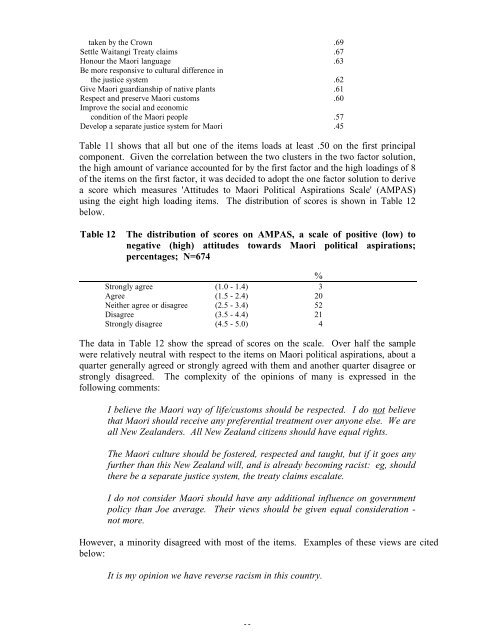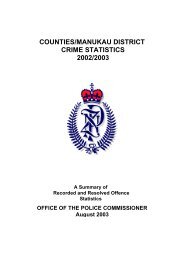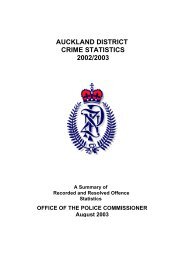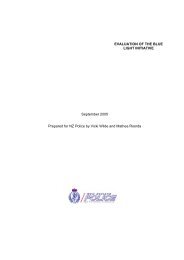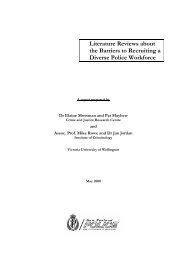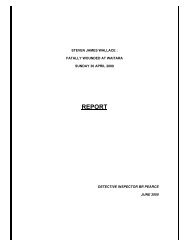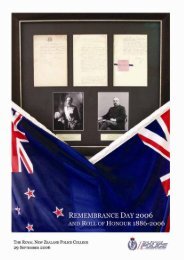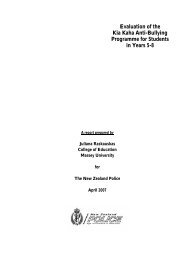Police Perceptions of Maori - Rethinking Crime and Punishment
Police Perceptions of Maori - Rethinking Crime and Punishment
Police Perceptions of Maori - Rethinking Crime and Punishment
You also want an ePaper? Increase the reach of your titles
YUMPU automatically turns print PDFs into web optimized ePapers that Google loves.
taken by the Crown .69<br />
Settle Waitangi Treaty claims .67<br />
Honour the <strong>Maori</strong> language .63<br />
Be more responsive to cultural difference in<br />
the justice system .62<br />
Give <strong>Maori</strong> guardianship <strong>of</strong> native plants .61<br />
Respect <strong>and</strong> preserve <strong>Maori</strong> customs .60<br />
Improve the social <strong>and</strong> economic<br />
condition <strong>of</strong> the <strong>Maori</strong> people .57<br />
Develop a separate justice system for <strong>Maori</strong> .45<br />
Table 11 shows that all but one <strong>of</strong> the items loads at least .50 on the first principal<br />
component. Given the correlation between the two clusters in the two factor solution,<br />
the high amount <strong>of</strong> variance accounted for by the first factor <strong>and</strong> the high loadings <strong>of</strong> 8<br />
<strong>of</strong> the items on the first factor, it was decided to adopt the one factor solution to derive<br />
a score which measures 'Attitudes to <strong>Maori</strong> Political Aspirations Scale' (AMPAS)<br />
using the eight high loading items. The distribution <strong>of</strong> scores is shown in Table 12<br />
below.<br />
Table 12<br />
The distribution <strong>of</strong> scores on AMPAS, a scale <strong>of</strong> positive (low) to<br />
negative (high) attitudes towards <strong>Maori</strong> political aspirations;<br />
percentages; N=674<br />
%<br />
Strongly agree (1.0 - 1.4) 3<br />
Agree (1.5 - 2.4) 20<br />
Neither agree or disagree (2.5 - 3.4) 52<br />
Disagree (3.5 - 4.4) 21<br />
Strongly disagree (4.5 - 5.0) 4<br />
The data in Table 12 show the spread <strong>of</strong> scores on the scale. Over half the sample<br />
were relatively neutral with respect to the items on <strong>Maori</strong> political aspirations, about a<br />
quarter generally agreed or strongly agreed with them <strong>and</strong> another quarter disagree or<br />
strongly disagreed. The complexity <strong>of</strong> the opinions <strong>of</strong> many is expressed in the<br />
following comments:<br />
I believe the <strong>Maori</strong> way <strong>of</strong> life/customs should be respected. I do not believe<br />
that <strong>Maori</strong> should receive any preferential treatment over anyone else. We are<br />
all New Zeal<strong>and</strong>ers. All New Zeal<strong>and</strong> citizens should have equal rights.<br />
The <strong>Maori</strong> culture should be fostered, respected <strong>and</strong> taught, but if it goes any<br />
further than this New Zeal<strong>and</strong> will, <strong>and</strong> is already becoming racist: eg, should<br />
there be a separate justice system, the treaty claims escalate.<br />
I do not consider <strong>Maori</strong> should have any additional influence on government<br />
policy than Joe average. Their views should be given equal consideration -<br />
not more.<br />
However, a minority disagreed with most <strong>of</strong> the items. Examples <strong>of</strong> these views are cited<br />
below:<br />
It is my opinion we have reverse racism in this country.<br />
22


